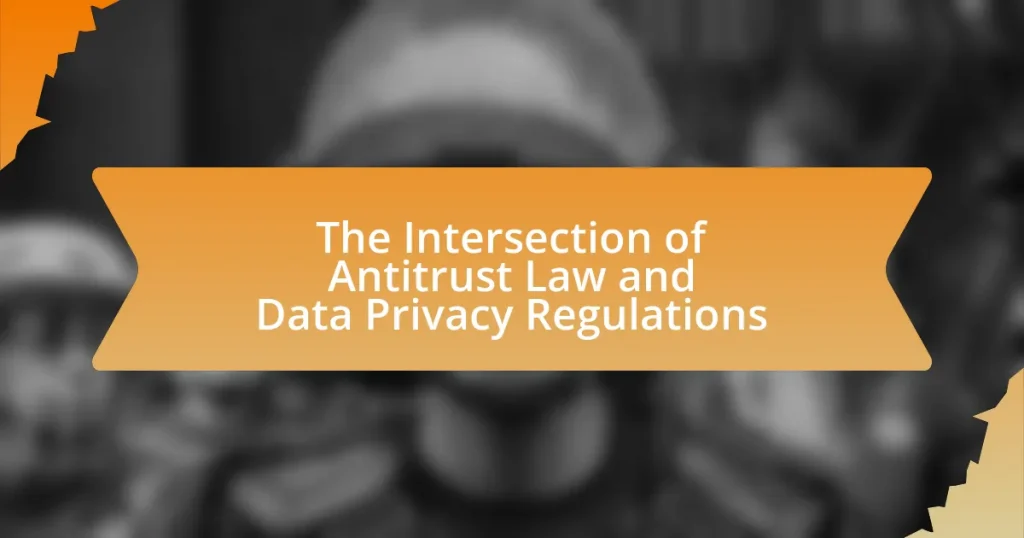Antitrust laws are evolving to address the challenges posed by the digital economy, particularly concerning technology giants and digital platforms. Regulatory bodies, including the Federal Trade Commission and the European Commission, are implementing new frameworks to tackle issues such as data privacy, market dominance, and anti-competitive practices. Key legislative updates, such as the European Union’s Digital Markets Act and the American Innovation and Choice Online Act, aim to ensure fair competition and consumer protection in the digital landscape. The article explores the challenges faced by antitrust laws, the impact of digital monopolies on market competition, and the necessity for legislative reforms to adapt to the complexities of the digital economy. Additionally, it examines the enforcement mechanisms and implications of non-compliance with antitrust regulations.

How are Antitrust Laws Evolving in the Digital Economy?
Antitrust laws are evolving in the digital economy by increasingly addressing the unique challenges posed by technology giants and digital platforms. Regulatory bodies, such as the Federal Trade Commission and the European Commission, are implementing new frameworks that focus on issues like data privacy, market dominance, and anti-competitive practices specific to online environments. For instance, the European Union’s Digital Markets Act aims to prevent monopolistic behavior by imposing stricter rules on major tech companies, ensuring fair competition and consumer protection. Additionally, recent legislative proposals in the United States, such as the American Innovation and Choice Online Act, seek to curb anti-competitive practices by prohibiting self-preferencing and other unfair tactics used by dominant platforms. These developments reflect a growing recognition that traditional antitrust approaches must adapt to the complexities of the digital landscape, where market dynamics and consumer interactions differ significantly from those in traditional industries.
What are the key challenges faced by Antitrust Laws in the digital landscape?
Antitrust laws face significant challenges in the digital landscape primarily due to the rapid pace of technological innovation and the complexity of digital markets. These laws struggle to keep up with the emergence of new business models, such as platform economies and data-driven services, which often operate across multiple jurisdictions. Additionally, the difficulty in defining market dominance in digital spaces complicates enforcement, as traditional metrics may not apply. For instance, companies like Google and Facebook dominate their respective markets through network effects and data accumulation, making it challenging to assess anti-competitive behavior. Furthermore, the global nature of digital platforms creates jurisdictional issues, as different countries may have varying standards and regulations regarding competition. These factors collectively hinder the effectiveness of antitrust laws in addressing monopolistic practices and ensuring fair competition in the digital economy.
How do digital monopolies impact market competition?
Digital monopolies significantly reduce market competition by creating barriers to entry for new firms and limiting consumer choices. These monopolies, such as those held by major tech companies, often leverage their dominant market positions to engage in anti-competitive practices, such as predatory pricing and exclusive contracts, which stifle innovation and deter potential competitors. For instance, a report by the European Commission in 2020 highlighted that companies like Google and Amazon utilize their market power to disadvantage smaller rivals, leading to a less competitive landscape. This concentration of market power can result in higher prices and reduced quality of services for consumers, as the lack of competition diminishes the incentive for monopolistic firms to improve their offerings.
What role does consumer data play in Antitrust considerations?
Consumer data plays a critical role in antitrust considerations by influencing market competition and consumer choice. The collection and use of consumer data can create significant advantages for dominant firms, enabling them to engage in anti-competitive practices such as price discrimination or exclusionary tactics. For instance, the European Commission’s investigation into Google highlighted how the company’s data practices could stifle competition by favoring its own services over rivals, demonstrating the impact of data on market dynamics. Additionally, the Federal Trade Commission has emphasized the importance of data in assessing market power, as firms with extensive consumer data can leverage insights to outmaneuver competitors, thereby raising concerns about monopolistic behavior.
Why is there a need for legislative updates in Antitrust Laws?
Legislative updates in Antitrust Laws are necessary to address the evolving challenges posed by the digital economy. The rapid growth of technology companies and digital platforms has led to new forms of market dominance and anti-competitive practices that existing laws may not adequately cover. For instance, the rise of data monopolies and the use of algorithms can create barriers to entry for smaller competitors, necessitating a reevaluation of legal frameworks to ensure fair competition. Historical examples, such as the antitrust case against Microsoft in the late 1990s, illustrate the need for timely updates to prevent monopolistic behaviors that can stifle innovation and harm consumers.
What historical context has shaped current Antitrust regulations?
The historical context that has shaped current Antitrust regulations includes the late 19th and early 20th centuries, marked by the rise of monopolies and trusts in the United States. The Sherman Antitrust Act of 1890 was the first federal legislation aimed at curbing monopolistic practices, responding to public outcry against corporate giants like Standard Oil and U.S. Steel. Subsequent legislation, such as the Clayton Antitrust Act of 1914 and the Federal Trade Commission Act of 1914, further defined and expanded the scope of antitrust laws to address anti-competitive practices and protect consumer welfare. These foundational laws established a framework that continues to influence modern antitrust enforcement, particularly as new challenges arise in the digital economy, where market dominance by tech giants raises concerns similar to those of historical monopolies.
How have recent technological advancements influenced Antitrust policy?
Recent technological advancements have significantly influenced Antitrust policy by prompting regulators to reassess market definitions and competitive practices in the digital economy. The rise of digital platforms, such as Google and Amazon, has led to increased scrutiny over monopolistic behaviors and data privacy concerns, resulting in legislative proposals aimed at enhancing competition. For instance, the European Union’s Digital Markets Act, enacted in 2022, targets large tech companies to prevent anti-competitive practices and ensure fair market access. This shift reflects a growing recognition that traditional antitrust frameworks may be inadequate in addressing the complexities of digital markets, necessitating new approaches to maintain competitive integrity.

What are the Recent Legislative Updates in Antitrust Laws?
Recent legislative updates in antitrust laws include the introduction of the American Innovation and Choice Online Act and the Open App Markets Act, both aimed at addressing anti-competitive practices in the digital economy. These bills seek to prevent major tech companies from engaging in self-preferencing and discriminatory practices that harm competition. For instance, the American Innovation and Choice Online Act specifically targets platforms like Amazon and Google, prohibiting them from favoring their own products over those of competitors. Additionally, the Open App Markets Act aims to ensure fair competition in app stores by allowing developers more freedom and reducing the control of dominant platforms. These updates reflect a growing recognition of the need to adapt antitrust regulations to the challenges posed by digital markets.
Which countries have implemented significant Antitrust reforms recently?
The United States, European Union, and Germany have implemented significant antitrust reforms recently. In the United States, the Federal Trade Commission has increased scrutiny on big tech companies, leading to lawsuits against companies like Google and Facebook. The European Union has introduced the Digital Markets Act, which aims to regulate large online platforms and promote competition. Germany has updated its competition laws to address digital market dominance, allowing for more aggressive actions against anti-competitive practices. These reforms reflect a global trend towards stricter regulation of monopolistic behaviors in the digital economy.
What are the main features of the new Antitrust regulations in the EU?
The main features of the new Antitrust regulations in the EU include stricter rules against anti-competitive practices, enhanced scrutiny of digital platforms, and increased penalties for violations. These regulations aim to prevent market dominance by large tech companies, ensuring fair competition and consumer protection. For instance, the Digital Markets Act specifically targets gatekeeper platforms, imposing obligations to promote competition and transparency. Additionally, the regulations empower the European Commission to impose fines of up to 10% of a company’s global turnover for non-compliance, reinforcing the seriousness of these measures.
How do the U.S. legislative updates compare to those in other regions?
U.S. legislative updates on antitrust laws are generally more fragmented and industry-specific compared to those in regions like the European Union, which has a more unified and proactive regulatory framework. For instance, the U.S. has seen various state-level initiatives and federal proposals that target specific issues, such as the American Innovation and Choice Online Act, while the EU has implemented comprehensive regulations like the Digital Markets Act, which applies broadly to major tech platforms. This difference highlights the EU’s approach of establishing clear, overarching rules aimed at preventing anti-competitive practices across the digital economy, whereas the U.S. tends to adopt a more reactive stance, addressing issues as they arise rather than through preemptive regulation.
What specific cases have prompted changes in Antitrust legislation?
The specific cases that have prompted changes in Antitrust legislation include the United States v. Microsoft Corporation in the late 1990s, which addressed monopolistic practices in software, and the more recent cases against Google and Facebook for anti-competitive behavior in digital advertising and search. The Microsoft case led to increased scrutiny of tech monopolies and the need for regulatory reforms, while the actions against Google and Facebook have spurred discussions on updating antitrust laws to better address the complexities of the digital economy. These cases highlight the evolving nature of market dominance and the necessity for legislative adaptations to ensure fair competition.
How have high-profile tech company investigations influenced policy changes?
High-profile tech company investigations have significantly influenced policy changes by prompting lawmakers to reevaluate and strengthen antitrust regulations. For instance, the investigations into companies like Google and Facebook have led to increased scrutiny of monopolistic practices, resulting in legislative proposals aimed at enhancing competition in the digital marketplace. The U.S. House Judiciary Committee’s report in 2020, which detailed anti-competitive behaviors of major tech firms, has been a catalyst for proposed bills such as the American Innovation and Choice Online Act, aimed at preventing large platforms from favoring their own products over competitors. These investigations have underscored the need for updated regulatory frameworks that address the unique challenges posed by the digital economy, leading to a more proactive approach in antitrust enforcement.
What lessons can be learned from recent Antitrust litigation outcomes?
Recent antitrust litigation outcomes highlight the importance of adapting legal frameworks to address the complexities of the digital economy. These cases demonstrate that traditional antitrust principles must evolve to effectively regulate monopolistic behaviors in tech industries, as seen in the outcomes against major companies like Google and Facebook, which faced scrutiny for anti-competitive practices. The rulings emphasize the need for clearer definitions of market dominance and consumer harm, as courts increasingly consider data control and platform ecosystems as critical factors in determining anti-competitive behavior. Additionally, the outcomes suggest that proactive regulatory measures may be necessary to prevent anti-competitive practices before they become entrenched, indicating a shift towards more anticipatory enforcement strategies in antitrust law.

How are Antitrust Laws Enforced in the Digital Economy?
Antitrust laws in the digital economy are enforced through a combination of regulatory oversight, legal actions, and investigations by government agencies such as the Federal Trade Commission (FTC) and the Department of Justice (DOJ). These agencies analyze market behaviors, assess mergers and acquisitions, and investigate anti-competitive practices to ensure fair competition. For instance, in 2020, the DOJ filed a landmark antitrust lawsuit against Google, alleging that the company engaged in anti-competitive practices to maintain its monopoly in search and advertising. This case exemplifies how enforcement actions are taken to address potential violations of antitrust laws in the digital landscape.
What agencies are responsible for enforcing Antitrust laws in the digital space?
The Federal Trade Commission (FTC) and the Department of Justice (DOJ) are the primary agencies responsible for enforcing antitrust laws in the digital space. The FTC focuses on preventing unfair methods of competition and deceptive practices, while the DOJ enforces federal antitrust laws through litigation and investigations. Both agencies have increased scrutiny on major technology companies to ensure compliance with antitrust regulations, reflecting the evolving challenges posed by the digital economy.
How do these agencies adapt their strategies to address digital market dynamics?
Agencies adapt their strategies to address digital market dynamics by implementing updated regulatory frameworks that reflect the unique challenges of the digital economy. For instance, the Federal Trade Commission (FTC) and the Department of Justice (DOJ) have revised their guidelines to focus on anti-competitive practices specific to online platforms, such as data monopolization and algorithmic manipulation. These adaptations are evidenced by the introduction of new legislative measures, like the American Innovation and Choice Online Act, which aims to prevent dominant platforms from favoring their own services over competitors. Additionally, agencies are increasing their collaboration with international counterparts to address cross-border digital market issues, ensuring a cohesive approach to regulation.
What tools and methodologies are used in digital Antitrust investigations?
Digital antitrust investigations utilize a combination of data analytics, economic modeling, and legal frameworks to assess competitive practices. Data analytics tools, such as machine learning algorithms, are employed to analyze large datasets for patterns indicative of anti-competitive behavior, while economic modeling helps in understanding market dynamics and the impact of specific practices on competition. Legal frameworks provide the necessary guidelines for evaluating compliance with antitrust laws. For instance, the European Commission has implemented the Digital Markets Act, which outlines specific obligations for major digital platforms, thereby guiding investigations. These methodologies ensure a comprehensive approach to identifying and addressing anti-competitive practices in the digital economy.
What are the implications of non-compliance with Antitrust laws?
Non-compliance with antitrust laws can lead to severe legal and financial consequences for businesses. Companies found in violation may face substantial fines, which can reach billions of dollars, as seen in cases like the $5 billion fine imposed on Google in 2018 for antitrust violations. Additionally, non-compliance can result in the dissolution of mergers or acquisitions that are deemed anti-competitive, as evidenced by the Federal Trade Commission’s (FTC) actions against major corporations. Furthermore, businesses may suffer reputational damage, leading to a loss of consumer trust and market share. Legal actions can also result in lengthy litigation processes, diverting resources and attention from core business operations.
What penalties do companies face for violating Antitrust regulations?
Companies that violate antitrust regulations face significant penalties, including hefty fines, legal sanctions, and potential criminal charges. For instance, the Federal Trade Commission (FTC) and the Department of Justice (DOJ) can impose fines that may reach up to $100 million for corporations, or even double the amount of the profits gained from the illegal activity. Additionally, companies may be subject to injunctions that restrict their business practices, and executives can face imprisonment for criminal violations, with sentences that can exceed ten years. These penalties are designed to deter anti-competitive behavior and maintain market integrity.
How can companies proactively ensure compliance with evolving Antitrust laws?
Companies can proactively ensure compliance with evolving Antitrust laws by implementing robust compliance programs that include regular training, monitoring, and legal audits. These programs should be designed to adapt to changes in legislation and market practices, ensuring that employees understand the implications of Antitrust laws on their operations. For instance, the Federal Trade Commission (FTC) and the Department of Justice (DOJ) have increased scrutiny on digital platforms, highlighting the need for companies to stay informed about regulatory updates and enforcement actions. By conducting periodic risk assessments and engaging legal experts, companies can identify potential compliance gaps and address them promptly, thereby minimizing the risk of violations and associated penalties.
What best practices should companies follow to navigate Antitrust laws in the digital economy?
Companies should implement transparency, compliance training, and proactive legal assessments to navigate Antitrust laws in the digital economy. Transparency involves clear communication of business practices and pricing strategies to avoid deceptive practices that could trigger investigations. Compliance training ensures that employees understand antitrust regulations and the implications of their actions, reducing the risk of violations. Proactive legal assessments involve regular reviews of business practices by legal experts to identify potential antitrust risks, allowing companies to adjust strategies before issues arise. These practices are essential as digital platforms face increased scrutiny from regulators, evidenced by recent antitrust actions against major tech companies, highlighting the importance of adherence to evolving legal standards.



